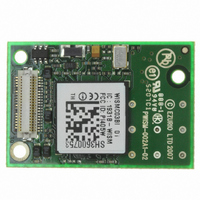WISMC03BI Laird Technologies, WISMC03BI Datasheet - Page 10

WISMC03BI
Manufacturer Part Number
WISMC03BI
Description
MODULE LAN 802.11B/G BISM
Manufacturer
Laird Technologies
Series
EZURiOr
Specifications of WISMC03BI
Frequency
2.4GHz
Data Rate - Maximum
1Mbps
Modulation Or Protocol
802.11 b/g
Applications
AMR, Automotive, ISM
Power - Output
15dBm
Sensitivity
-86dBm
Voltage - Supply
3.3 V ~ 5.5 V
Current - Transmitting
250mA
Data Interface
Connector, 50 Pin, DF-12
Memory Size
64Mbyte Flash, 16MByte SRAM
Antenna Connector
U.FL
Operating Temperature
-40°C ~ 85°C
Package / Case
Module
Wireless Frequency
2.412 GHz to 2.484 GHz
Interface Type
UART
Board Size
22.8 mm x 33.8 mm x 7.6 mm
Modulation
BPSK, CCK, DSSS, QPSK
Security
WEP 64/128, WPA-PSK, WPA2, TKIP, AES-CCMP
Lead Free Status / RoHS Status
Lead free / RoHS Compliant
Current - Receiving
-
Lead Free Status / Rohs Status
Lead free / RoHS Compliant
6.
The Wireless LAN module is designed for use with a host system that implements a TCP/IP stack. It
provides a UDP stack and SLIP interface to allow fast integration. The integrated, high performance
antenna together with the RF and baseband circuitry provides the Wireless LAN connectivity and the
UART interface for a connection to a host system.
6.1
6.1.1
Modem signal nomenclature can be a source of great confusion, particularly on devices which can be
configured in either DCE (Data Communications Equipment) or DTE (Data Terminal Equipment) format.
For the purpose of this data sheet all UART signals are defined on the assumption that the module is
being used as a conventional DCE. I.e it is behaving like a serial PSTN modem.
UART_TX, UART_RX, UART_RTS and UART_CTS form a conventional asynchronous serial data port with
handshaking, conforming to the ITU-T v.24 standard for DCE signalling. The interface is designed to
operate correctly when connected to other UART devices such as a 16550A. Note that the signalling
levels are a nominal 0V and 3.0V and are inverted with respect to the signalling on an RS232 cable.
The interface is programmable over a variety of baud rates, with no, even or odd parity, one or two
stop bits and hardware flow control.
please contact EZURiO. Auto-bauding is not supported.
On power-up the UART defaults to 115200,n,8,1.
Note that there is no standardisation regarding the nomenclature of RX and TX across a DCE-DTE
interface.
across a cable, whereas other show TX driving RX to reflect logical port directions. Always check the
direction of ports on DCE and DTE.
In a DCE mode, where the module is being driven as a peripheral by a host processor application, the
UART signals should be connected according to the following scheme:
Two-way hardware flow control is implemented by UART_RTS and UART_CTS. In DCE mode, UART_RTS
is an OUTPUT and is active low. UART_CTS is an INPUT and is active low. These signals operate
according to normal industry convention.
Some serial implementations link UART_CTS and UART_RTS to remove the need for handshaking.
EZURiO does not recommend linking UART_CTS and UART_RTS other than for testing and prototyping.
If these pins are linked and the host sends data at the point that the Wireless Module deasserts its
UART_RTS signal, then there is a significant risk that internal receive buffers will overflow which could
lead to a loss of data. EZURiO recommend that the correct UART_CTS to UART_RTS handshaking
protocol be adhered to in order to ensure proper operation.
The UART_DSR signal is an input to the module to place it in Powersave Mode 2.
The operation, meaning and direction of the UART_RI and UART_DCD signals is user programmable.
DSH_WISMC03_0v97 WISM 40 pin SLIP Data Sheet.doc
Functional Description
Interfaces
Port UART_TX transmits data to the application’s /RXD input.
Port UART_RX receives data from the application’s /TXD output.
Some implementations show TX(DCE) connected to TX(DTE) to give naming consistency
UART interface
Non-standard baud rates are supported – for more information
© 2007-8 EZURiO Ltd
Page 10

















